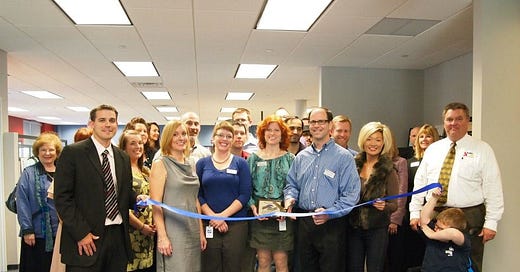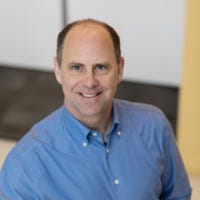The 1970s and 80s were a time when tinkerers came of age with the personal computer. Like auto or aviation enthusiasts before them, many didn’t plan to become auto mechanics or pilot aircraft. They were fascinated by a new machine and learned its capabilities and constraints for adventure and found(ed) a profession.
These were the original hackers, before the term’s negative connotation took hold, who went a step or two deeper into the technology to understand how it worked, make it work differently than imagined, and make it do more than its design. David Safris’ story follows such an arc - similar to those that developed throughout the US in the 1990s.
Show up early and work harder and longer than everyone else — grandpa
ISU degree in hand and grandfather’s advice in mind, David knew he’d be an entrepreneur as small business flowed in his blood. The first step of employment at Kirk Van Orsdel (KVI) Insurance would help him point in the eventual direction and a chance observation there serve as the spark that launched a career and company.
Genesis and Spark
KVI actuaries regularly received reams of green-line, dot-matrix output only to trash all but the final 3-4 pages. Curiosity led him to ask why and then seek permission to find a better way to avoid that much waste. He found himself learning the intricacies of the data used to create those printouts and then writing software to load the very data into a database. He learned the FoxBASE database language to only print out exactly what the actuaries needed. The innate curiosity, a desire to make something better, and serve the end customer’s actual need would deliver time and time again.
He took another step and launched S2 (Systems & Software) in January 1992.
Early discovery
One of David’s initial projects was to automate scheduling then accomplished on paper for Windsor Windows. As he programmed this routine task, his observation and curiosity uncovered an opportunity.
Windsor Windows had recently invested in a large facility and an equally large cutting machine. The machine, acquired to precisely cut material, posed an interesting operating challenge. No automation tools accompanied the machine and work and had to be operated through complex instructions. Realizing the machine’s true strength was automation and not cutting prowess, David found himself learning its language over the next three weeks.
Imagine his pride and his coworker’s delight when his bespoke software generated precise instructions, wrote them to a disk, and loaded them to the machine. The rudimentary solution led the giant machine to produce precise cuts to form the vinyl casings necessary.
David had found constraints at KVI and Windsor Windows and created ways to eliminate them. Constraints created when the original system designer didn’t take time to understand the end customer’s real problem or motivation. Once resolved, however, the constraints created growth through opportunity.
S-squared to Visionary history
David’s team grew and made Suite 230 their office at 108 3rd street in Des Moines in the Court Avenue neighborhood. Their upstairs neighbor in Suite 320 was Visionary Systems, a team investing in Firehouse Software, a product designed for fire stations. The neighbors found affinity and an opportunity arose to help Visionary. Over time, as the two worked together, a camaraderie developed, and an opportunity arose to forge a formal relationship. The two companies merged in the late 1990s and S-squared was retired as a company and brand in 1997.
The companies grew their product lines in parallel, sharing in some but not all profits. The trajectory of Firehouse Software began to grow separately and at a higher velocity, enough to attract the attention of a national acquirer in 2004. Visionary Systems split into two - Visionary Systems and Visionary Services. The former was absorbed by and became a part of ACS Government Systems, Inc. and now operates as a part of ESO. The glimpses of the original Visionary Systems’ 1992 origin can be seen through the windows of ESO’s office on the corner of 8th Street and Locust Ave in downtown Des Moines.
A new separate company, Visionary Services began its new life under David’s leadership in 2004 and continues to this day. The court avenue neighborhood was soon replaced with a new space in East Village, where the company continues to operate from today.
Almost blowing the shot
The 1990s were an opportune time for enterprising programmers who, first gradually and then all at once, developed a skill in a specific line of business. They gradually grew by relying upon referral networks to find new business. Companies such as marketing or ad agencies, tax and accounting services, and staff augmentation companies were a rich source of these referrals. One such referral source for the Visionary team was a marketing agency who brought them to FedEx.
Overnight delivery networks were expanding, and FedEx was actively investing in improving its customer experience. The Internet and maps-based lookups years away, shippers needed quick access to the closest drop-off points. Printed guides would go out of date almost on the day they were printed, and phone-based information was slow (remember calling 1-800-GO-FEDEX for info?). The Visionary team developed a system to receive, ingest, optimize, and publish a lookup tool to diskettes. These diskettes were then shipped to customers seeking local lookups.
A routine meeting with FedEx had David and team addressing a series of upgrades for which FedEx asked for a quote. David promised one in 4-5 days, only to be presented with a new constraint:
Are you really offering a quote in 4-5 days to a company that receives and delivers 12 million packages within 24 hours?
Landing the whale
A proposal was developed on the flight home, through the night and morning and delivered the next day. Grandpa’s advice won and the quote’s acceptance sealed the company’s future with a global customer. The team continued to develop and deliver the solution even as a constraint forever loomed large in this pre-Internet delivery world: continue to ship on an optimal number of diskettes. Three.
The holy grail of a huge customer achieved, the team began counting exit-worthy dollars, unaware of the Internet’s threat just around the corner. Online lookups made the diskettes obsolete in a few short years and FedEx appeared to be done even as another constraint was lurking in the shadows, one that the Visionary team had learned to manage in the years optimally shipping disks:
The Internet economy’s new oil - data. And data that had to be fresh, consistent, true, available, and clean.
David’s team had solved the constraint of an optimal number of diskettes by making the location data consistent, true, clean and eminently usable. They were using it to generate fresh sets of disks. This unique position allowed them to rapidly pivot from being disk producers to creating a data pipeline between Memphis and Des Moines. The company had transformed itself to a data vendor.
Grandpa’s advice would guide once again. These data pipelines, though automated, needed babysitting - a new constraint. With reliable and trustworthy remote access still a few years away, David found himself driving downtown just to monitor the data download and cleansing processes and keeping FedEx systems humming.
I wasn’t going to fail for lack of effort
Creating a legacy
David acknowledges the missteps along the way, some caused by the universal emotion felt by founders everywhere of knowing it all. Whether it was in designing the merger agreements or a succession plan, advisors and mentors might have led to different outcomes. Though no regrets persist, David’s acknowledgement is sage advice to today’s founders:
solicit and receive inputs even as you make the final decisions
One such decision is not simply selling the company to an outsider but to insiders who bought into its ownership which allows the spirit and legacy to continue.
Balancing various forms of wealth
In an article he published for the Foster Group in 2020, David explored the balance of three forms of wealth - financial, health, and time. Embodying Socrates’ “it’s later than you think” philosophy, he created and found balance between work, family, and play. His family moved to Colorado to be closer to their extended family and create opportunities to engage in his passion for fast cars.
David knew that he wanted to build a company that would live beyond his work. He wasn’t interested in building a company to sell and was equally disinterested in it becoming his whole life. To balance the three forms of wealth, he experimented with various models for founder exits and ultimately chose the model to sell a part of the company to a few existing employees and maintain a portion himself. Individuals who had been on the journey with him would now shape the company in their vision. He continues to serve on the board, collaborate with his Visionary partners and team, and accepts the moniker “Grandpa Dave” with aplomb.
As you book your seats for the next musical or show hosted by Des Moines Performing Arts on their website, think of the decades of Visionary team’s experience that built it. And the legacy that continues through their work from East Village in Des Moines.
Sources
Interview with David - February 2025
Visionary Website
Web Archives
ESO
The Foster Group
Team Photo from Yelp
I am a proud member of the Iowa Startup Collective, a group of writers exploring entrepreneurship across Iowa. Click the link above to checkout my peers’ work







